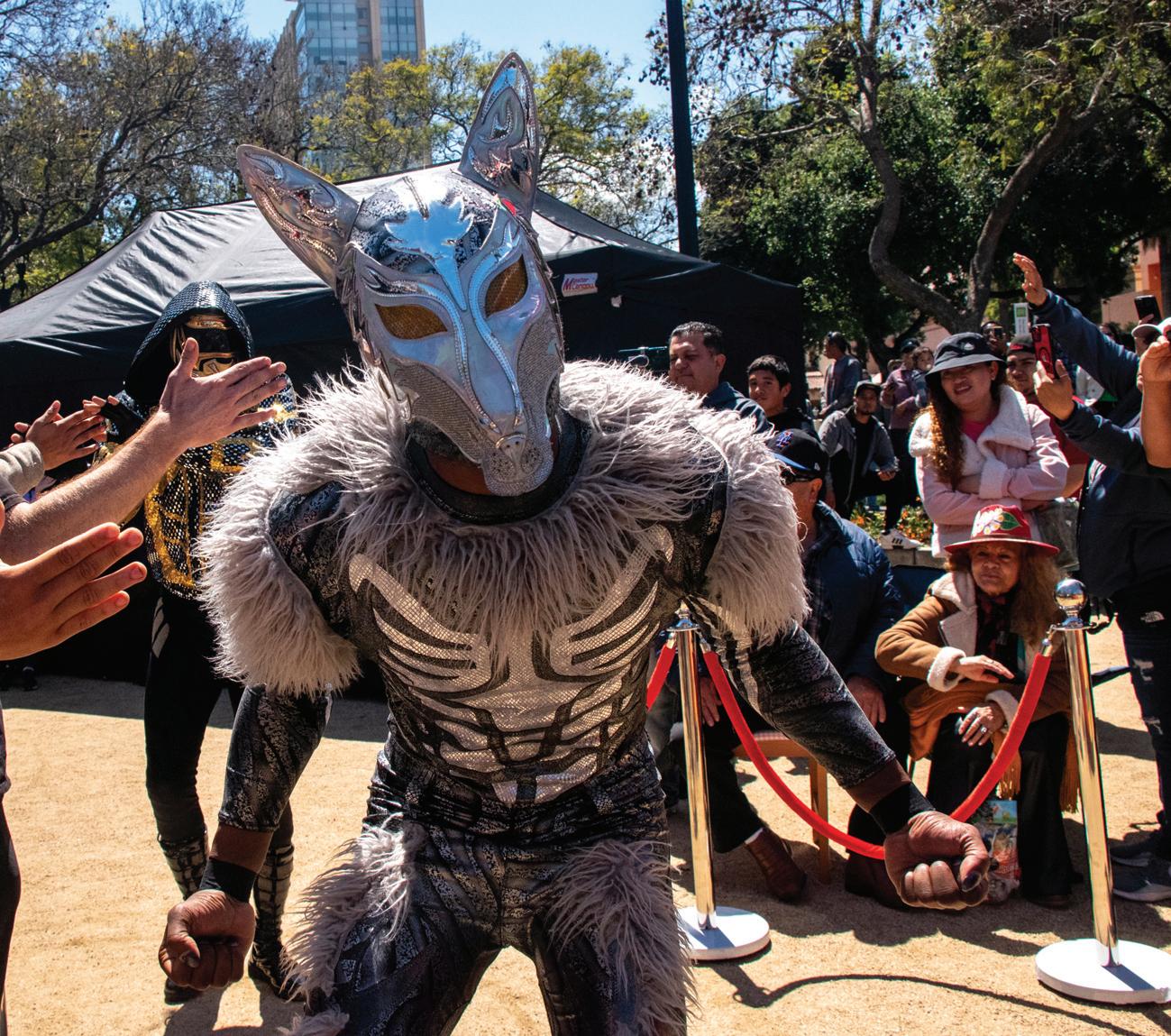

SJPD blocks Cinco De Mayo traffic
By Alina Ta & Melany Gutierrez EDITOR & MANAGING EDITORMultiple community members and visitors were stuck in traffic after police officers from the San José Police Department (SJPD) blocked off half a dozen streets around San José to control traffic on Sunday during Cinco de Mayo.
Between mid-afternoon and the late evening hours on Sunday, SJPD police officers blocked different streets during different parts of the day, according to a map from SJPD’s April 5 media advisory.
During night time, police officers gave hand signals to direct traffic and talked to drivers on
the side of the road.
Jacqueline Gonzalez, a resident of the Bay Area, said she was just trying to make it to her destination and feels it’s unreasonable to block the roads.
Gonzalez said she saw police officers asking for IDs from drivers and passengers, and said that she thinks it’s a little too extra.
“We (she and her friends) were saying what if we just say that we live here and then so we could go through (the road blockades),” Gonzalez said.
She said there was no announcement ahead of time of the road blockades.
On April 5, SJPD announced that it would “deploy additional personnel and resources to ensure public safety” and to block different
streets in San José during the Cinco de Mayo weekend, according to its media advisory.
The purpose of the road closures is to ensure community members and visitors can celebrate during the holiday weekend safely, according to the same media advisory.
SJPD stated in the advisory that “street diversions will only occur when it is deemed necessary” to lessen and ease traffic in areas that have more pedestrian and vehicular traffic.
Every effort was expected to be made to allow residents living in or near blocked areas affected by the road closures to leave and return to their homes “without unreasonable delay,” according to the

same advisory. The streets that were closed off between 7 a.m. and midnight were East Santa Clara Street, South Market Street and South King Road, according to the same map from SJPD.
10 p.m.
She said some of the police officers directing traffic were helpful, but some were dismissive.
“(They) just kind of wanted traffic to keep going even though I was
me it's not fair,” she said. “If you're just not cautious about Chicano culture, then I could see how it's scary, but for people that are cautious about our culture, it's not scary at all.”
If you're just not cautious about Chicano culture, then I could see how it's scary, but for people that are cautious about our culture, it's not scary at all.
San José resident Carlos Alexander Mejiá Alfaro said his car was parked near the Spartan Gas Station, which is one block away from San José State University.
“My car is over there, I’ve been trying to talk to the police to see if he will let me go get it but he doesn’t speak Spanish,” Alfaro said in Spanish.
Alondra Ramirez, a resident in Downtown San José, felt stressed from the blockades.
Ramirez said she spent over 30 minutes trying to find her way home.
She said the police are more active on Cinco de Mayo because more people want to socialize on the streets and race, but she doesn’t think it’s that big of a deal.
Monica Sánchez said she is from East Los Angeles, but has been living in San José for three years.
Sánchez said she lives on one of the blocked streets and was still unable to go home at around
trying to explain to them that I live in the city, in the area that they’re closing down,” she said. “So yeah, it can be inconvenient.”
Sánchez, who is Mexican American, said she thinks holidays that represent certain marginalized groups, like Cinco de Mayo, are targeted by the police.
Sánchez said she is from Puebla, the city in Mexico where Cinco de Mayo is traditionally celebrated.
Puebla is the city where the holiday originates from, according to a May 5, 2022 article by The New York Times.
Cinco de Mayo also honors and remembers Mexico’s victory over France in the Battle of Puebla on May 5, 1862, according to the same article.
“For me to see people that just celebrated to get drunk, even that's a little annoying, but to even have just law enforcement kind of prevent people from celebrating that I mean, that's a little – for
San José resident Mariana Sandoval said she thinks SJPD overdid it this year and that people are still going to behave the same way regardless of the increase in police presence.
“Since 2020 if anything they've been more stricter on it and you know, kicking everybody off the streets and . . . moving them to a different place,” Sandoval said.
Marvin Peraza, an aviation sophomore at SJSU, said he wasn’t annoyed by the road blockades.
Peraza said he feels the police are trying to keep people safe, including from drivers who may be under the influence.
“It's like a sense of community, just like to block the streets,” Peraza said. “Just like everyone came out and just, like, vibed together.”

Cinco De Mayo fills streets of San José


3


5 4 6 1 2



Forensic Science Club hosts scavenger hunt




1 2 5 4 6 3


#1: Students make decorations for SJSU’s Forensic Science Club’s scavenger hunt.
#2: An SJSU student figures out a possible piece to the puzzle to the crime scene.
#3: A group of four students laugh together while solving part of the mystery.
#4: A puzzle put together of a man and woman holding hands lies on the table.
#5: Two students work in tandem to solve the clues of the game.
#6: Two students put their minds together to put the puzzle together.


Dear Editor,
There is a clear distinction between military spending and foreign aid.
Currently, the United States government spends more on the military than any other country in the world, with over $700 billion put towards military efforts.
United States defense spending is the second largest item in the budget after Social Security.
How much of the US federal budget is allocated for foreign aid? Less than 1%. Despite this numeric, most Americans think foreign aid constitutes around 25% of the budget, which is a major overestimation.
At a time when nearly 1 billion people are hungry worldwide, one child dies every 3.6 seconds from poverty, lack of clean water, hunger, and preventable diseases, it is critical for the U.S. to put forth more spending on foreign aid.
The international community has made it a top goal to eradicate global poverty by 2030, but with current progress, it is difficult to see this goal met in the future.
As a supporter of the Borgen Project, an innovative organization fighting global poverty, I believe that our leaders should be doing more to protect the International Affairs Budget.
Foreign aid decreases food insecurity in developing countries, expands global education, and reduces poverty.
It also improves our own economy and national security. Povertyreducing international aid directly comes back to positively impact American jobs.
I urge our community to take note. If we want to win the fight against global poverty, everyone has to be aware of the issue at hand. Everyone has to pitch in.
It takes no longer than 5 minutes to make a call or email local leaders about supporting The Foreign Affairs Budget.
Visit The Borgen Project action center to make your voice heard.

Correction
On May 2, the Spartan Daily published the photo package “Urban Putt is put in Downtown San José”, Día de los Muertos was misidentified as Cinco de Mayo.
On Feb. 20, the Spartan Daily published an article “Video: Professor grabs student”, where Dorah Rosen was misidentified as Dorah Rosen Shuey.
The Spartan Daily regrets these errors.

University changed my life for
















 Maya Benmokhtar
Maya Benmokhtar
In a city located in the heart of Silicon Valley, stands San José State University – a beacon of learning and discovery.
It was here that my journey of self-discovery began, amidst the hallowed halls of academia and the jumble of campus life.
As a wide-eyed freshman, I arrived at SJSU with many dreams.
Excitement coursed through my veins as I stepped onto campus eager to embark on this new chapter of my life.
Little did I know that college would shape my intellect but also profoundly impact my sense of self.
I dived into a world of knowledge, explored subjects I had never encountered before, and engaged in discussions that challenged my perspectives.
Don't get me wrong, some classes were not for me, and my grades reflected that.
I took the first two years of college for granted and received a big slap in the face.
I was placed on academic probation because of my poor attendance and low grades.
For months, I questioned if college was the right path for me, even questioning if I really was worthy of a career in the field of journalism.
I felt like a failure – I needed

I am fueled by a passion for storytelling and thirst for knowledge with a commitment to upholding the principles of truth, integrity and empathy.
Journalism is more than just a profession – it is a calling.
As an aspiring journalist, I want to be a voice for the voiceless.
It’s not just about reporting the facts – it is about telling stories that resonate with readers, stir emotions and spark conversations that drive positive change.
Above all, I aspire to be a journalist who makes a difference.
I am incredibly thankful for the light college sparked in my life.
I am proud of myself for not giving up and taking the easy way

out or even when things got the best of me and I felt like nothing was worth it.
As graduation day approaches, I reflect on the transformative journey that has brought me to this moment – a journey of soulsearching and growth. College equipped me with knowledge and skills but also, through the challenges it has instilled in me a sense of purpose and identity.
I emerge from these formative years with a diploma in hand but also a deeper understanding of myself and the world around me. In the end, college was more than just an academic institution – it was a path of self-discovery.



